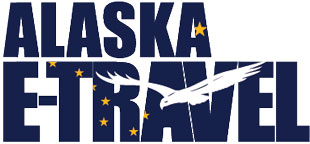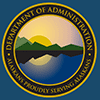
Travel
E-Travel News
November 2018 - Volume 10, Issue 6
In This Issue
- Alaska Airlines Up Their Baggage Fees
- Rental Car Reminders for State Travelers
- Private Lodging Platforms (Airbnb™)
- New Security Screening Technology
Alaska Airlines Up Their Baggage Fees
Alaska Airlines has updated their ancillary baggage fees. Effective for tickets purchased or last exchanged on or after December 5, 2018, the below standard baggage fees will apply.
Club 49 members will still be allowed limited free bags when traveling on Alaska Airlines. Additional bags and overweight/oversized baggage will be charged under the new fee structure.
| Standard Traveler | Club 49 Member Travelling Wholly Within Alaska | Club 49 Member Traveling Outside Alaska | |
|---|---|---|---|
| Carryon Bag | Free * | Free | Free |
| 1st Checked Bag | $30 * | Free | Free |
| 2nd Checked Bag | $40 * | Free | Free |
| 3rd Checked Bag | $100 | Free | $100 |
| 4+ Checked Bag(s) | $100 each | $100 each | $100 each |
| Overweight Bag | $100 | $100 | $100 |
| Oversize Bag | $100 | $100 | $100 |
| * Correction of the fee from the original posting. | |||
- Travelers with elite mileage status should refer to Alaska Airlines for more details.
- Additional baggage information can be found on Alaska Airlines here.
Rental Car Reminders for State Travelers
The use of the State car contract rate is not mandatory; however, the contract rate includes unlimited liability and insurance coverage and has payment requirements to ensure no taxes are charged to the State of Alaska.
The contract rate is a flat rate, it does not change seasonally or by demand like a regular rate. At times, the contract rate may be lower or higher than the regular rate depending on the season and demand in the rental location. It is important to note that the regular rate does not include unlimited liability or insurance coverage. A Traveler that elects to take a “cheaper” rate or a non-contract vendor will be responsible for any damage to the vehicle, which may result in paying more than the contract rate.
Liability and Insurance
Travelers or planners that choose a non-contract vendor based on personal convenience or pricing are placing additional collision/damage liability responsibility on their department. If a contract rate was available at the time of booking and the Traveler or planner declined the rate, Risk Management will decline liability. The Traveler’s department will be responsible for all costs related to repair. If no contract rate was available at the time of booking and the itinerary was documented as “Contract Rates Sold out”, Risk Management will provide liability coverage.
Form of Payment Requirements
A State form of payment is required to pay for the contract rate to ensure taxes are waived and to ensure the rental is used only for official State business. If a Traveler elects to use a personal form of payment, they are not eligible for the contract rate, they will be charged tax, and they will be responsible for any damage to the vehicle. Traveler reimbursement may not exceed the minimum business itinerary quote obtained in E-Travel Online.
Per the AAM 60.065 Taxes Related to Travel the Traveler must identified themselves as a State Traveler upon check in and verify no tax has been charged for services or products in Alaska upon check out. Some vendors will refuse to reverse payments or taxes after the drop off period.
Damage to a Rental Car
Regardless of the rate booked, in the event of damage to a rental vehicle the Traveler is required to report to the vendor or they may be held responsible for the costs to repair.
Private Lodging Platforms (Airbnb™)
There is no policy restricting the use of private lodging platforms such as Airbnb™; however, there are number of concerns that should be considered prior to booking for official State business.
- Private lodging cost per night may not exceed standard commercial hotel cost per night.
- Loss of hotel volume negative impacts the State preferred rates in that market.
- Tax exempt status must be applied for rentals within the state. The payment process for private lodging vendors is handled systematically and some may require an official document to waive tax. It is the responsibility of the Traveler to ensure no taxes are charged within the state.
- Private lodging platforms such as Airbnb™ require a unique user login; therefore, our travel service contractor (CTM) is not able to book, modify, or cancel that segment of travel. This results in additional calls when travel plans change as well as a loss of travel data/spend for the State.
- Private lodging platforms often include booking restrictions that can be costly to the State. For example, advanced cancellation requirements that exceed 48 hours, and nonrefundable or changeable rates. Consider weather and mechanical delays and cancellations as well as possible changes to the State business need.
- Up front security and cleaning deposits and reclaim of deposits after the fact pose liability issues and additional time to reconcile.
- Insurance and liability may not be the same as a standard hotel. (FEMA approved – fire and evacuation safety requirements.)
New Security Screening Technology
You may have noticed that several U.S. airports have installed Automated Screening Lanes to help expedite the Transportation Security Administration (TSA) screening process. This new conveyor belt system allows for multiple passengers to simultaneously load and unload screening bins to accommodate for slower moving passengers. Sea-Tac Airport currently has Automated Screening Lanes open at Checkpoint 5, with more lanes coming soon. Check out the video to see how it works.
A new body scanning device used by Los Angeles County’s rail system is being tested by TSA. The new technology uses thermal imaging to screen multiple passengers at the same time from up to 25 feet away. If the device passes the initial testing, it may be used as a trial at some U.S. airports. Check out the complete story.
